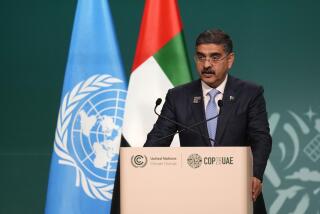THE WORLD : PAKISTAN : Americans’ Murders Shouldn’t Sour Ties
- Share via
WASHINGTON — Even in Karachi, Pakistan’s commercial capital of 10 million, where murder and mayhem have become daily fare, it came as a shock. Gang and drug-related violence, ethnic strife and fighting between rival Shiite and Sunni sects have escalated in recent months, tearing at Pakistan’s social fabric. But before the armed assault on three American employees of the U.S. consulate in the capital last week--which left two dead, one an intelligence agent--Westerners had not been targets.
So chaotic is Karachi these days that not only do local police, mostly viewed as corrupt and incompetent, not respond to disorder, but even the Pakistani army, after being called in to restore order, gave up and left. The ambush of a U.S. consulate van at a crowded intersection during morning rush hour is a reflection of a city--and a society--spinning out of control, whose fragile democracy may be unraveling, and whose wobbly relations with the United States may be all the more difficult to realign.
Pakistan’s Radcliffe-educated prime minister, Benazir Bhutto, who will meet here with Bill Clinton next month in an effort to improve economic and military ties, swiftly condemned the attack as “part of a well-planned campaign of terrorism.” While no group has yet claimed credit for the attack, a senior U.S. official conceded that “it was almost certainly political.”
The leading theory, offered by Bhutto’s mother, is that the murders were in retaliation for the capture, in Pakistan, of Ramzi Ahmed Youssef, the 27-year-old Iraqi suspected of masterminding the 1993 World Trade Center bombing. Ramzi is awaiting trial in New York.
Another theory is that the assailants may have been working for drug lords (Karachi is a major transshipment center for heroin) who the United States wants extradited to face trial here.
Bhutto’s generally cooperative attitude on such issues is not popular in Pakistan, which is increasingly being drawn into the Islamic resurgence stirring the Middle East and Central Asia. U.S. officials, privately bemoaning a lack of leadership by the politically weak Bhutto, fear an erosion of state authority. But it is a circular problem: Handicapped by declining support from the urban middle class and Sunni Muslims in Sind province, and skepticism from the powerful military, Bhutto’s political frailty limits her ability to restore order or confidence, which, in turn, emboldens the forces of ethnic and religious intolerance that imperil stability in Pakistan.
The current turmoil is the legacy of former Pakistani strongman, Gen. Mohammed Zia ul Haq and the Afghanistan war. To justify his rule and to transform Pakistan into a key player in the Islamic world, he cultivated Islamic parties and introduced Islamic law in Pakistan. After the Soviet invasion of Afghanistan, the United States, focused on the larger goal of rolling back Soviet expansionism, overlooked Zia’s flaws and his agenda. Washington and conservative Islamic allies channeled aid through Pakistani military and intelligence officials to the moujahedeen in Afghanistan.
But not without some cost. Apart from continued civil war in Afghanistan, the flood of guns and drugs in Pakistan, along with the growing appeal of Islam, now threaten to plunge Pakistan into chaos. The recent victory of Taliban, the Islamic student movement that has displaced the feuding mullahs in Afghanistan, has also made the idea of a “third force” in Pakistani politics attractive. The movement’s rallying point is a charismatic ex-cricket superstar who has turned into a Islamic firebrand, Imran Khan. He has cultivated ties to pro-Islamic factions of the military and intelligence agencies.
For the United States, it is tempting to see all this as the “clash of civilizations” and Islam as simply a threat. Many Pakistanis feel betrayed by the United States, which quickly abandoned its alliance of convenience with Pakistan after Moscow left Afghanistan in 1990 and cut off aid to protest the country’s nuclear program. More recently, the West’s failures in Bosnia and Chechnya, where Muslims are the majority, have fanned Islamic resentment.
But as sectarian strife suggests, Islam is not a monolith, and the West would be wise to distinguish between legitimate Islamic ideals and values and terrorism carried out in its name. The United States should not respond to the murders of Americans in Karachi by walking away from what has been a moderate Islamic nation. Since Pakistan is at the center of civil wars in Afghanistan, Tajikistan and Kashmir, the stakes--including a potential nuclear conflict with India--are large. With an economy undergoing privatization, and a military Establishment that will always be a power broker in any scenario, there is good reason to forge a new, post Cold War relationship with Pakistan. Bhutto’s forthcoming visit will be a good place to start.*
More to Read
Sign up for Essential California
The most important California stories and recommendations in your inbox every morning.
You may occasionally receive promotional content from the Los Angeles Times.










